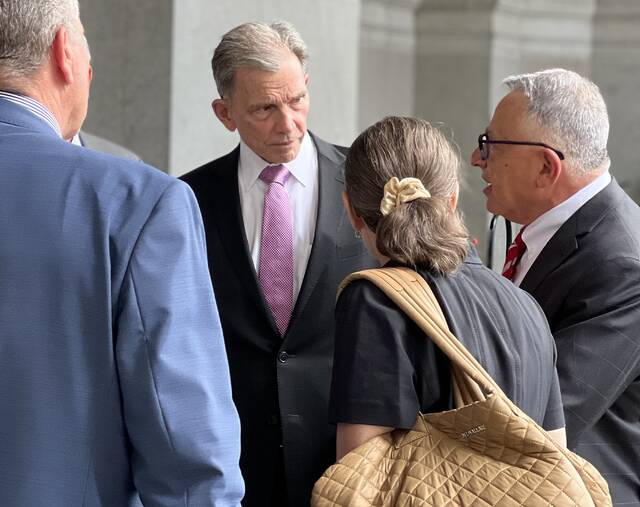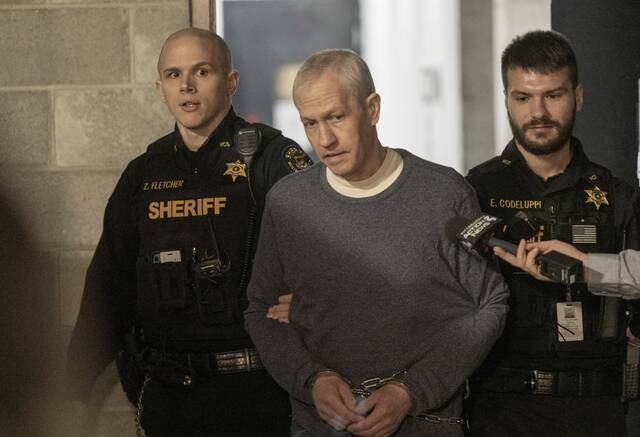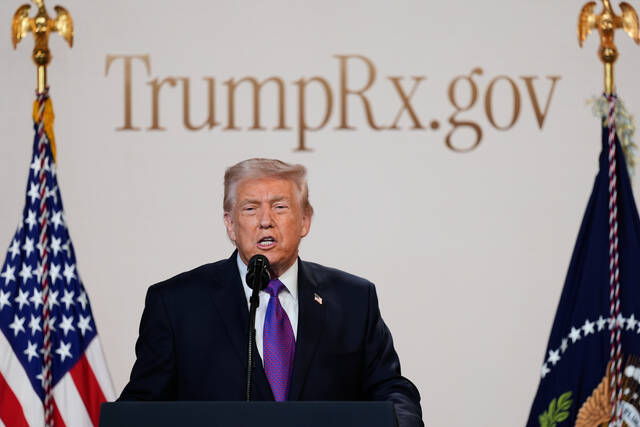The doctor who continues to treat UPMC’s head of cardiothoracic surgery with suboxone testified Wednesday that he kept no patient records of his interactions with Dr. James Luketich.
Dr. David Wilson also testified that he never reviewed Luketich’s previous treatment records or saw records from an addiction treatment facility where Luketich spent five days in 2018.
Wilson was called to testify in an injunction hearing over the surreptitious recording of a conversation between he and Luketich in February 2018 while the two talked in an observation room at UPMC Presbyterian hospital.
In testimony earlier Wednesday, a digital audio expert retained by Luketich’s attorney said he believed the secret recording had been doctored.
“It’s been manipulated,” said Jerry Hatchett, who traveled from Houston to Pittsburgh to testify. “What was originally recorded is not represented on the file we have today.”
Luketich, who is at the center of a federal whistleblower complaint and a civil malpractice case, is attempting to have the recording excluded as evidence. He argues that the recording was illegally made and violates state wiretap laws requiring parties to have knowledge that they are being recorded.
Attorneys representing the patient in the malpractice case argued that the recording was made in a public space in the hospital — the door code to the room was written on the outside door jamb, they noted — and Luketich should have had no expectation of privacy.
The hearing, which ran Monday through Wednesday of this week, is now recessed until an unknown date.
During testimony before Allegheny County Common Pleas Judge Philip A. Ignelzi, Luketich said he had been prescribed suboxone for a slipped disc around 2008. He also testified that in the late 1980s, he was prescribed painkillers for a shoulder injury and eventually believed he might have dependency issues. Luketich said he voluntarily sought help and remained in a state program for physicians for years.
On Wednesday, Wilson said he had been prescribing suboxone to Luketich for at least 10 years and that he monitored him closely — meeting at least once a month and sometimes more often.
He testified that Luketich did well on suboxone and had it under control — and that they had reduced his dosage over time.
“Neither Dr. Luketich nor I had anything to hide,” Wilson said.
The day that the recording was made, on Feb. 26, 2018, Luketich texted Wilson, writing, “If you can, I need a script and would like to talk about stuff.”
Wilson met him around 1:30 p.m. He said that he and Luketich were the only ones inside the room as they spoke.
“I am sure the doors were closed regardless of what room we were in,” he said. “They were always closed. They were private conversations.”
Wilson testified on direct examination by Luketich’s attorney, Efrem Grail, that the two had no knowledge that they were being recorded. In part, Wilson said, they were talking as a doctor and patient.
“Did you give anyone permission to record?” Grail asked.
“Absolutely not,” Wilson answered.
Luketich has accused two former UPMC colleagues, Dr. Jonathan D’Cunha and Dr. Lara Waleed Schaheen, of potentially recording the conversation in retaliation against him and then using it to damage his career and reputation. Luketich has cross-filed a defamation claim against them both.
D’Cunha, who filed the federal whistleblower complaint, left UPMC in 2019. He also submitted an anonymous complaint about Luketich to UPMC administrators in April 2018.
During cross-examination, Wilson said he never told anyone at UPMC that he was treating Luketich with suboxone, but he denied he was treating him for active addiction.
Instead, Wilson said, “Dr. Luketich was addicted to opioids in the far-off past. He was a recovered addict.
“Dr. Luketich is a reformed prescription drug addict who has chronic pain.”
But attorney Scott Livingston continued to push Wilson on what evaluations or other treatments he’d prescribed for Luketich to treat that chronic pain.
There were none.
Instead, Wilson took Luketich’s word that he had tried other treatments that didn’t work. Wilson admitted he’d never reviewed any of Luketich’s previous medical records, including ones from a pain specialist he had seen for years in Butler.
“I have complete confidence in Dr. Luketich’s honesty,” Wilson said.
Tempers flared throughout the cross-examination, with Grail accusing Livingston of “character assassination.”
The dust-up culminated with Judge Ignelzi shouting from the bench and slamming his hand down on it.
“Mr. Livingston, stop when I say stop!” Ignelzi yelled. “I’ve got seasoned attorneys in front of me. Act like it.”
For at least the second time in the hearing, he warned the attorneys that he would call the sheriffs and hold them in contempt.
Wilson testified that Luketich had weaned down to a smaller dose of suboxone over time but had not been able to stop taking the drug entirely.
Luketich said he went to Caron Addiction Treatment Center for five days in October 2018 to participate in a five-day study of suboxone.
Wilson testified that he believed the trip was unnecessary and tried to dissuade him.
“I think he volunteered to go because he wanted an absolute independent evaluation of his addiction status,” Wilson said.
Wilson, who is a pulmonologist, also acknowledged during his testimony that he gets paid $50,000 per year out of Luketich’s budget.
When the digital audio expert Jerry Hatchett testified earlier Wednesday, attorneys representing the patient in the malpractice suit, as well as D’Cunha, objected to the testimony.
Robert Barnes, who represents D’Cunha, argued that their side has been unable to have an analysis done on the recording because they aren’t in possession of it.
“We don’t have the tape, and we haven’t been able to analyze the tape in any way,” he said.
Attorney Patrick Loughren, who represents the patient in the lawsuit, also objected.
“How every other lawyer in this case has this tape but us is beyond me,” he said.
Ignelzi said Hatchett could testify, and “if at the end, you convince me this is hokey-pokey science … then I’ll ignore it.”
Hatchett said he was hired by Grail late last week to do an analysis on the recording. He received a digital copy of the recording, which was originally turned over to the FBI on a cassette.
While Hatchett said he would like additional time to do more analysis and work with the original recording, he believed he could hear a spot in the recording he analyzed that shouldn’t be there.
That spot, a less-than-5-second section of the recording, occurs at the 1 minute, 55 second mark of the nearly 11-minute file. Hatchett was prohibited from talking about the contents of the recording because of a protective order. The recording has been played in court, but only behind closed doors with the media and public excluded.
“The recording we have today does not reflect the phrase that was spoken by the speaker in the room,” Hatchett said.
He said he used visual analysis, which looks at the amplitude of sound, as well as a spectrogram, which displays frequency over time.
Hatchett testified that the recording went from someone speaking clearly to something garbled.
“I saw a sharp, vertical line in the spectrum,” he said. “That indicates something abrupt happened.”
At that point, Hatchett said, he slowed the recording down to 33% of its actual speed and listened to that segment as many as 100 times.
“It became very evident that instead of two words specifically mentioned as having been said, we have three separate sounds with a gap between them,” he said.
“There was a pause there between the words that was not natural.”
Although Hatchett could not offer any opinion as to who might have doctored the recording, he said it would not have been difficult to do, noting that software programs easily allow portions of conversations to be cut and copied elsewhere.
“You find the words you want to be said, copy them and paste them where you want them to be,” he said.
“Was it a good job?” Grail asked.
“No,” Hatchett answered. “A bad job like this one was easily detected. It’s readily apparent something is wrong when you listen to that segment of the tape.”
On cross-examination, Hatchett said that the recording was of a low-quality to start with, and that it’s unclear if it was originally a digital recording transferred to a cassette, or if it was originally recorded on a cassette.
“We have sounds here that have been rearranged,” he said. “That’s different than low quality.”
Hatchett said it was unlikely that when the FBI made the digital copy of the file that they would have altered it in any way, or used any filters on it.
He also testified that he did not think that the recording came from a “pocket dial,” where a person accidentally dials a number on their cellphone without realizing it.








